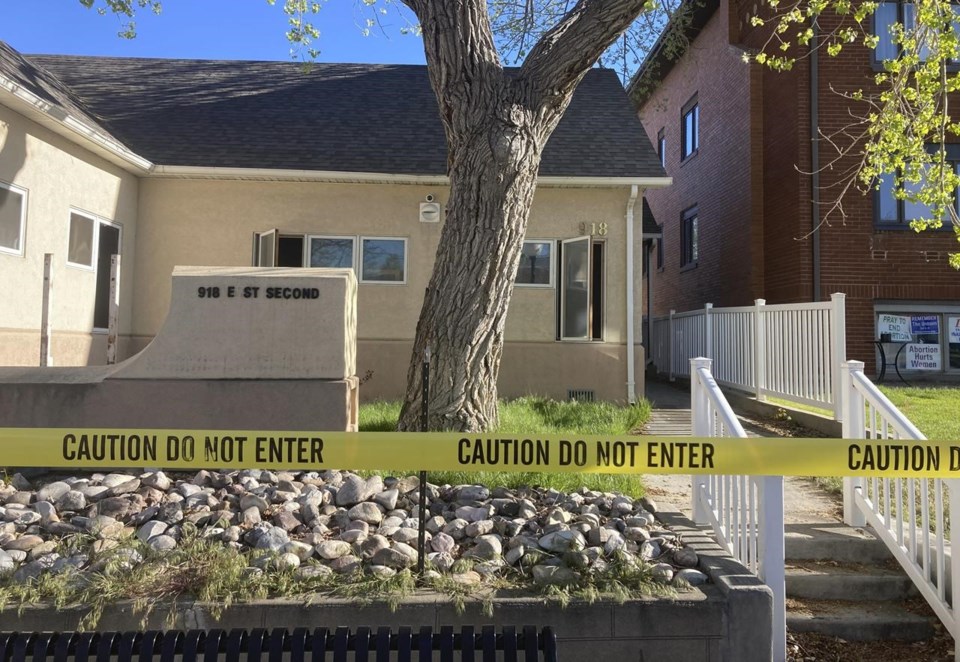FARGO, N.D. (AP) — that will delay the closing of North Dakota’s lone abortion clinic should provide more than enough time to move the business to a , the facility’s owner and operator said Thursday.
In fact, Red River Women’s Clinic director Tammi Kromenaker said she was prepared to open shop in Moorhead, Minnesota, next week if the North Dakota’s abortion ban had gone into effect Thursday. She said now, though, she'll have more time to make sure the move from Fargo goes smoothly.
“At this time, we will continue to see patients in North Dakota for another few weeks as we continue to acquire furniture and supplies for the new space in Minnesota,” Kromenaker said.
Thanks to a technicality in the law, Burleigh County Judge Bruce Romanick in essence gave the clinic at least a 30-day reprieve when he ruled that Attorney General Drew Wrigley was too hasty in scheduling the Fargo clinic to close Thursday. Wrigley certified the closing after the U.S. Supreme Court overturned Roe vs. Wade last month, when he should have waited for the court's official judgment, which typically is issued within 25 days of a ruling, Romanick said.
Wrigley filed another certification letter Wednesday with the North Dakota Legislative Council that would put the trigger ban into effect on Aug. 26. As the clinic presses on with its lawsuit arguing that the North Dakota Constitution guarantees the right to abortion, Kromenaker said she will continue the transition to Moorhead with no gap in services.
“We are scheduling patients as usual, which is usually one week out,” she said.
A GoFundMe page to raise money for the transition from Fargo to Moorhead had topped $975,000 as of Thursday. In addition to the donations, the volunteer leader of the North Dakota Women In Need, which helps patients pay for travel costs, said she’s motivated by the numerous words of encouragement left by contributors, many of whom are from states
“We are getting messages like solidarity from Vancouver or sending you love from New Jersey,” said Destini Spaeth, the fund's director.
Separately Thursday, attorneys for 15 cities and counties, including New York, San Francisco, Chicago and others, wrote to the U.S. departments of Justice, Homeland Security and Transportation urging them to prohibit federal cooperation with state abortion bans, including any attempts to criminalize abortion or travel to receive abortion services.
In North Carolina, the Republican leaders of the state House and Senate asked a federal judge on Wednesday to vacate his 2019 ruling that blocked enforcement of the state's 20-week abortion ban in light of the Supreme Court overturning Roe.
Meanwhile, as the North Dakota clinic prepares to reopen in Minnesota, McKenzie McCoy, executive director of North Dakota Right To Life, said her group has a “strong network connection across state lines” and will make its presence known in Moorhead as well as Billings, Montana, which is the closest abortion clinic for women in western North Dakota.
“That is another opportunity to grow what I call the tree of life in North Dakota,” McCoy said. “We can extend those branches and create stronger relationships with other states.”
The clinic’s prospects to prevail on the bigger constitutional question in the lawsuit are unclear, and the case almost certainly will go before the state Supreme Court, regardless of how the judge rules.
Steven Morrison, a University of North Dakota law professor, said the state’s high court historically has been supportive of abortion restrictions and that its political orientation has not changed.
“I don’t think the North Dakota Supreme Court has ever ruled in any way in favor of abortion or related rights,” he said. “I’d be shocked and amazed if the court found the North Dakota Constitution entails the right to abortion.”
Amy Jacobson, executive director of Prairie Action ND, which advocates for “progressive values, messages and actions,” said the injunction shows that North Dakota state officials must follow the law and “can’t just do what they want,” but it won’t change the final outcome.
“Abortion will be banned in North Dakota in the coming weeks and I think that is what’s the most upsetting really,” she said. “No judge, no politician should really be allowed to take away personal medical decisions and that is what’s happening in North Dakota.”
___
Associated Press writer James MacPherson in Bismarck, North Dakota, contributed to this report.
Dave Kolpack, The Associated Press



